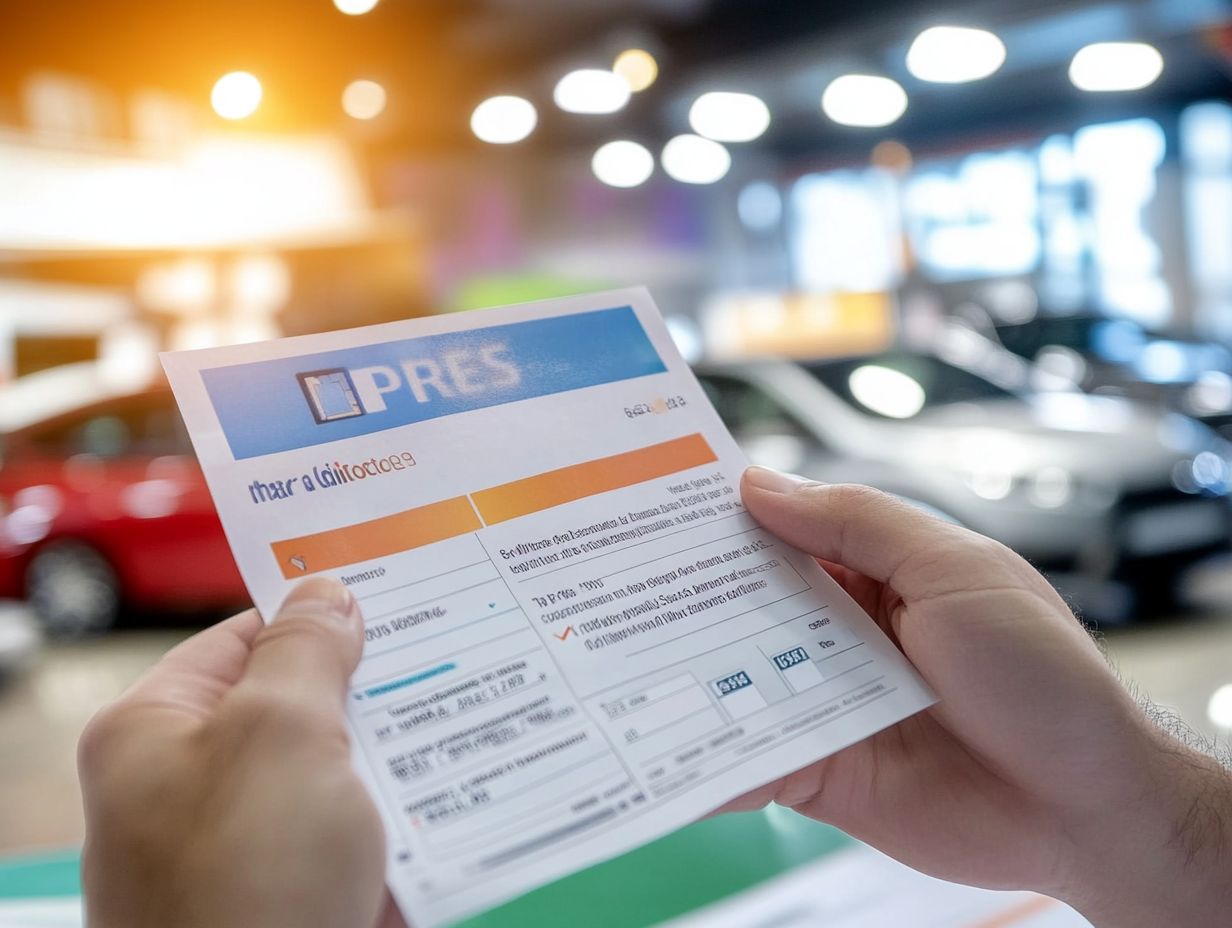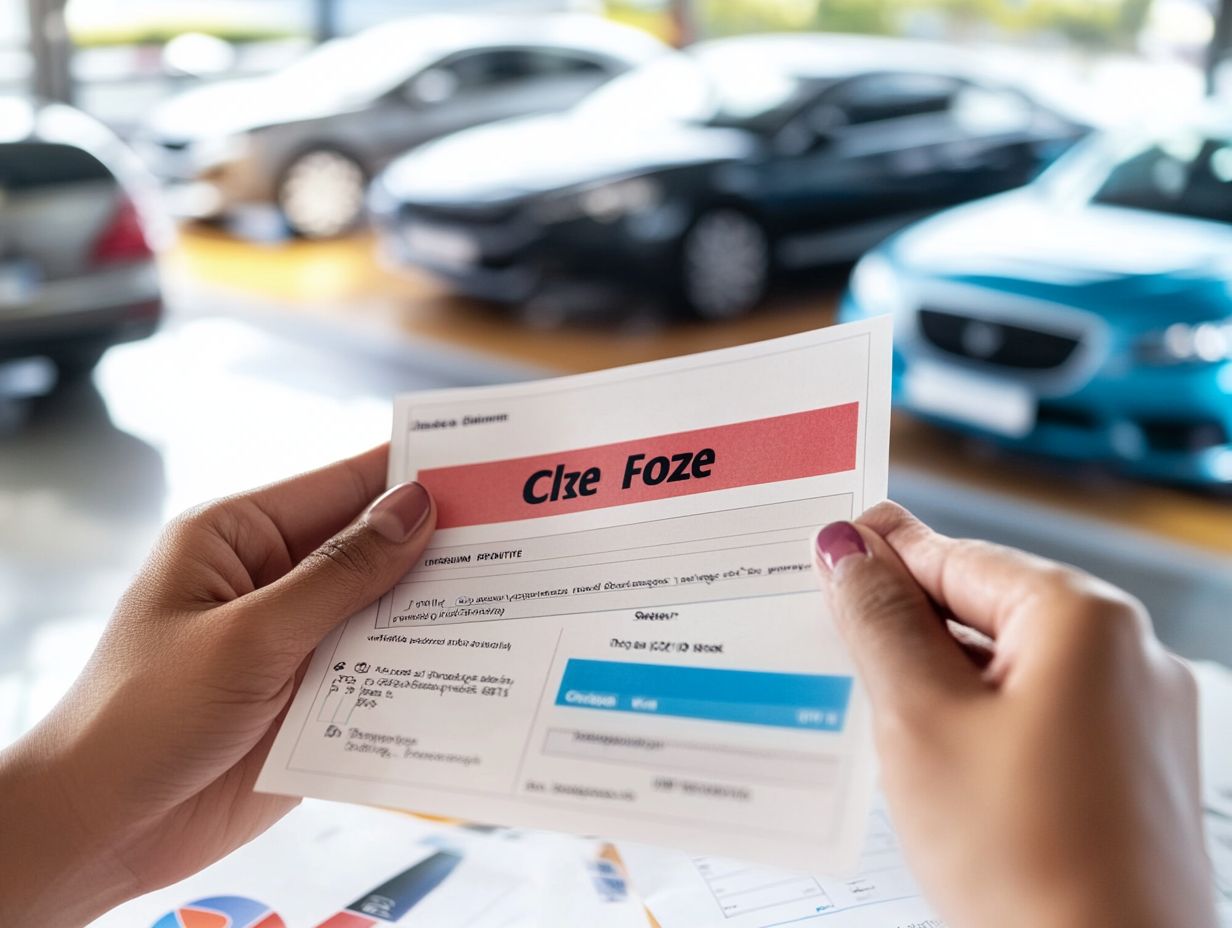The Importance of Credit Score in Car Financing
Your credit score is a vital component of your financial journey, especially when securing car financing.
Understanding what a credit score is and the factors that influence it is essential for anyone considering a vehicle purchase. This article also gives you practical tips to improve your score and explores alternative financing options.
Prepare to enhance your car-buying experience with the insights you need!
Contents
- Key Takeaways:
- Understanding Credit Scores
- Why Credit Score is Important in Car Financing
- Improving Your Credit Score for Car Financing
- Alternative Options for Car Financing
- Frequently Asked Questions
- What is a credit score and why is it important in car financing?
- How does a credit score affect car financing?
- Can I get a car loan with a low credit score?
- How can I improve my credit score before applying for car financing?
- Can my credit score affect my chances of getting approved for a car loan?
- What Should I Do If I Have a Low Credit Score and Need a Car Loan?
Key Takeaways:

Understanding Credit Scores
Understanding credit scores is vital for anyone wanting to secure the best auto loan! Your score can make a significant difference in the financing terms you receive.
A credit score shows how creditworthy you are. It is shaped by factors like your credit history, the types of credit accounts you have, and your financial behavior.
Different categories of credit scores exist, including FICO Score and VantageScore, each with its unique rating scale and criteria. Being informed about this can greatly influence your chances of approval when applying for a car loan, ultimately affecting the interest rates and terms that lenders may offer you.
What is a Credit Score?
A credit score is a numerical representation of your creditworthiness, derived from various factors in your credit report. This score is crucial for lenders evaluating your loan applications.
Typically, FICO scores range from 300 to 850, while VantageScore scores vary from 250 to 900, with higher numbers reflecting better credit health. Lenders rely on these scores to assess the risk of lending you money, impacting not only your loan approval but also the interest rates you’ll encounter. For example, if your score exceeds 700, it s often considered good, which can translate to lower rates on auto loans. Conversely, scores below 600 may lead to higher costs or challenges in securing financing.
By understanding these metrics, you can enable yourself to make informed financial decisions, significantly enhancing your chances of obtaining favorable loan conditions.
Factors that Affect Credit Scores
Several factors influence your credit score, including credit history, credit utilization, types of credit accounts, and timely repayment of loans.
Understanding the significance of each factor is essential for enhancing your creditworthiness. For instance, credit history accounts for about 35% of your credit score, reflecting how long you ve been borrowing and whether you ve managed your debts responsibly. A long, positive credit history can significantly boost your score.
Credit utilization is how much of your available credit you are using. It’s best to keep this below 30% to maintain a healthy score. Timely payments, which also comprise 35% of your score, are directly linked to your reliability in the eyes of lenders. A late payment can drop your score by as much as 100 points, showcasing the profound impact of one missed deadline.
Understanding loan terms can guide you as a borrower. For example, a longer loan term typically means smaller payments but can lead to higher overall interest costs.
Why Credit Score is Important in Car Financing

The significance of credit scores in car financing is paramount. They directly influence interest rates, loan terms, and your chances of approval for an auto loan, making pre-approval for car loans incredibly important.
A high credit score can open the door to lower interest rates. This translates into more favorable monthly payments and significant savings over time.
Conversely, a low score may subject you to higher rates and less appealing loan options.
Lenders use credit scores to evaluate risk and establish the loan terms. This makes it an essential element in the auto financing landscape.
How Credit Score Affects Interest Rates
A borrower’s credit score is crucial in determining the interest rate you ll receive on an auto loan. This influences your financial burden throughout the loan’s duration.
Credit scores typically range from 300 to 850. They reflect your trustworthiness for loans and affect not only auto loans but also mortgages and personal loans.
If you boast an excellent credit score usually above 750 you might snag an interest rate as low as 3%. If your credit is fair to good, you could find rates hovering between 5% and 10%.
On the flip side, if your credit score is poor, defined as falling below 600, brace yourself for interest rates that can exceed 15%, dramatically elevating your monthly payments.
Over time, these extra costs pile up, impacting your overall financial health and potentially limiting your future borrowing opportunities.
Impact on Loan Approval and Terms
Your credit score plays a crucial role in determining your chances of loan approval. It also influences the terms you ll encounter, affecting how favorable or restrictive those conditions will be.
A strong credit score opens the door to a variety of lender options. This grants you access to better interest rates and more flexible repayment plans.
For example, a higher score might mean a lower required down payment percentage, making it easier for you to secure that car loan you ve been eyeing.
If your score is on the lower end, you may face higher down payments and stricter loan terms, which can limit your choices and bump up your overall costs.
Ultimately, grasping the importance of credit scores empowers you to navigate financing opportunities with greater confidence. It encourages you to cultivate healthy credit habits that will work in your favor down the line.
Improving Your Credit Score for Car Financing
Boosting your credit score can unlock amazing financing options for your car loan! A higher score often translates to lower interest rates and more favorable loan terms, making a significant difference in your overall financial picture.
There are several strategies at your disposal to boost your credit score. These involve adjustments to your financial habits and a nuanced understanding of what affects your credit health.
By prioritizing factors such as credit utilization (the ratio of your credit card balances to your credit limits) and making timely payments, you can enhance your credit profile and significantly increase your chances of securing approval for the auto loan you desire.
Tips for Raising Your Credit Score

To raise your credit score effectively, adopt practices that enhance your credit profile. Focus on reducing your credit utilization and ensuring timely payments on your credit accounts.
Keep your credit utilization below 30% of your total credit limit to demonstrate responsible borrowing habits. This can positively influence your score.
Consistently paying off your credit card balances each month helps you avoid interest charges and signals reliability to lenders.
Regularly monitor your credit reports. This allows you to identify and rectify any discrepancies promptly.
These proactive measures not only contribute to a higher credit score but can also lead to improved financing terms for significant purchases, such as a new car. Ultimately, this enhances your overall financial well-being.
Alternative Options for Car Financing
When traditional financing options are hindered by a low credit score, exploring alternative car loan avenues can open doors for you. This enables the acquisition of the vehicle you desire without undue financial strain.
Consider options like enlisting a co-signer. Making a generous down payment or turning to specialized lenders can also boost your approval chances.
By grasping these alternatives, you empower yourself to navigate the complexities of financing, even with less-than-ideal credit.
Exploring Other Financing Options
Explore exciting alternative financing options for auto loans, even if your credit isn t perfect. One effective strategy is to utilize a co-signer or seek out lenders who specialize in high-risk borrowers.
Bringing a co-signer into the mix can significantly improve your chances of loan approval. It may even lead to more favorable terms since lenders view the creditworthiness of the co-signer as a safety net.
Weigh the potential consequences. Missed payments can affect the co-signer’s credit score.
Finding lenders that specifically cater to those with poor credit requires a bit of research. Digging into online reviews and exploring dedicated financial forums can yield valuable insights.
Ensure you thoroughly understand how these choices might affect your interest rates and overall loan obligations. This way, you can navigate the complexities of financing effectively and make informed decisions that serve your best interests.
How Credit Score Affects Leasing
A credit score plays a pivotal role in determining your leasing options. It shapes both your chances of approval and the terms of the leasing agreement.
A higher credit score often leads to more favorable conditions, such as lower monthly payments and a potentially reduced down payment.
Conversely, if your credit score is on the lower side, you may encounter stricter requirements. This could include needing to provide a larger upfront payment or facing longer lease terms.
Those with poor credit frequently deal with elevated interest rates, which can significantly inflate the overall cost of leasing.
To navigate these challenges and enhance your leasing terms, it s wise to regularly check your credit reports. Correct any inaccuracies, and take proactive steps to improve your score like keeping your credit card balances low and making timely payments.
Frequently Asked Questions

What is a credit score and why is it important in car financing?
A credit score is a numerical representation of an individual’s trustworthiness to lend money, based on their credit history and financial behavior. It is important in car financing because it helps lenders determine the risk of lending money to a borrower and what interest rate they should offer.
How does a credit score affect car financing?
A credit score can greatly impact car financing in terms of the interest rate and terms offered by the lender. A higher credit score often leads to lower interest rates and better loan terms, while a lower credit score can result in higher interest rates and less favorable loan terms.
Can I get a car loan with a low credit score?
Yes, it is possible to get a car loan with a low credit score. However, it may come with higher interest rates and stricter loan terms. Some lenders specialize in providing loans to individuals with lower credit scores. It is important to research and compare offers to find the best option.
How can I improve my credit score before applying for car financing?
There are several ways to improve your credit score before applying for car financing. Pay bills on time, reduce debt, and check for errors on your credit report. It is also important to maintain good credit habits after getting a car loan to continue building a positive credit history.
Can my credit score affect my chances of getting approved for a car loan?
Yes, your credit score is one of the main factors lenders consider when approving a car loan application. A low credit score may make it more difficult to get approved, while a high credit score can increase your chances of approval and potentially lead to better loan terms.
Ready to find the best financing options? Start your research today!
What Should I Do If I Have a Low Credit Score and Need a Car Loan?
Struggling with a low credit score? Don t worry you can still get a car loan!
If you have a low credit score and need a car loan, research and compare lenders to find the best option. Try to improve your credit score before applying, or find a cosigner with a higher score to boost your chances of approval.






